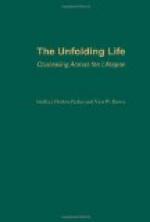For this fluctuation of purpose and failure to reach its high ideals, stern sentence is passed at the inner bar of judgment, and though the censure of another is resented, the soul bears great scars of flagellation, self inflicted. The standard of measurement by which the life tests itself and others is a new consciousness that there is absolute right and absolute wrong apart from all external coverings. The statements of others are examined, their actions are stripped of all veneer, profession and practice are balanced, and death sentence is passed upon the influence of any life that fails to meet the test. The compassion that remembers that we are but dust has no place in the heart as yet. Suffering will call out sympathy, but not failure to reach the mark. A life must ring true to God, true to its fellow men and true to the ideals conceived as belonging to it by these self-appointed judges, if it is to be of any help to them. It is therefore not a question whether the professing Christian, be he parent, teacher or church member, can indulge in doubtful amusements or uncertain practices without injury to himself. It is rather, “Are these things included in the ideal of a Christian life, as it is held by those whom I want to touch?” If they who bear the name of Christ exemplified more completely the ideals by which they are measured, would there be so many who question the reality of divine things?
It is during the closing period of Adolescence, ending with young men about twenty-four and with young women about twenty-one, that doubt most frequently appears. It comes rather as a questioning and bewilderment to the Christian, and scepticism to the one who has had no experience of divine things. Spiritual truth is not accepted because another has said it is so, but each desires to know for himself the foundation upon which he stands, that he may have a reason for the hope that is in him. Investigation seems to show that at least two out of three pass through this period of intellectual unrest, young men being in the majority.
Many causes contribute to this condition, but chief among them is the maturing strength of reason and will. The new power to think God’s thoughts after Him, to trace cause and effect, to understand subtle relationships, intoxicates the soul. Everywhere in the world around, the pre-eminence of reason is acknowledged. The atmosphere of the university and the college which surrounds the favored young men and women is an atmosphere of scientific accuracy, where reason applies the tests. The world of business, of finance and of statecraft all bow to reason,—why not the spiritual world, and then by searching, the soul attempts to find out God. As in the wisdom of God divine things do not yield up their treasures in intellectual investigation but in revelation, the thick darkness gathers. Even that which had been once known by faith seems strange and unreal from this new view point. It is a critical time for a soul when it is learning that in one realm reason does not go before, but faith. Any harshness or lack of sympathy on the part of another or evident disappointment in the life is very serious at this point. The will asserts itself under such measures and from the pliant attitude, “I cannot believe what I cannot explain,” it takes the defiant attitude, “I will not believe what I cannot explain.”




